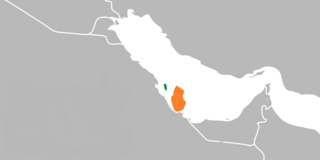Related Research Articles

The history of Qatar spans from its first duration of human occupation to its formation as a modern state. Human occupation of Qatar dates back to 50,000 years ago, and Stone Age encampments and tools have been unearthed in the Arabian Peninsula. Mesopotamia was the first civilization to have a presence in the area during the Neolithic period, evidenced by the discovery of potsherds originating from the Ubaid period near coastal encampments.

Sheikh Hamad bin Khalifa bin Hamad bin Abdullah bin Jassim bin Mohammed Al Thani is a member of the ruling Al Thani Qatari royal family. He was the ruling Emir of Qatar from 1995 until 2013 when he abdicated the throne, handing power to his son Tamim bin Hamad Al Thani. The Qatari government refers to him as the Father Emir.

Rahmah ibn Jabir ibn Adhbi al-Jalhami was an Arab ruler in the Persian Gulf region and was described by his contemporary, the English traveler and author, James Silk Buckingham, as 'the most successful and the most generally tolerated pirate, perhaps, that ever infested any sea.'

Sheikha Moza bint Nasser Al-Missned is one of the three consorts of Sheikh Hamad bin Khalifa Al Thani, the former Emir of the State of Qatar. She is a co-founder and chairperson of the Qatar Foundation.
Sudanese literature consists of both oral as well as written works of fiction and nonfiction that were created during the cultural history of today's Republic of the Sudan. This includes the territory of what was once Anglo-Egyptian Sudan, the independent country's history since 1956 as well as its changing geographical scope in the 21st century.
Josef (Yousef) Waleed Meri is an American historian of Interfaith Relations in the Middle East.

Qatar, officially the State of Qatar, is a country in Western Asia. It occupies the Qatar Peninsula on the northeastern coast of the Arabian Peninsula in the Middle East; it shares its sole land border with Saudi Arabia to the south, with the rest of its territory surrounded by the Persian Gulf. The Gulf of Bahrain, an inlet of the Persian Gulf, separates Qatar from nearby Bahrain. The capital is Doha, home to over 80% of the country's inhabitants, and the land area is mostly made up of flat, low-lying desert.

Qatar is a Muslim-majority country with Islam as the state religion. Salafi version of Islam is the state sponsored brand of Sunni Islam in the country, making Qatar one of the two Salafi states in the Muslim world, along with Saudi Arabia.
Sahar Khalifeh is a Palestinian writer. She has written eleven novels, which have been translated into English, French, Hebrew, German, Spanish, and many other languages. One of her best-known works is the novel Wild Thorns (1976). She has won numerous international prizes, including the 2006 Naguib Mahfouz literature medal for The Image, the Icon, and the Covenant.

The culture of Qatar is strongly influenced by traditional Bedouin culture, with less acute influence deriving from India, East Africa and elsewhere in the Persian Gulf. The peninsula's harsh climatic conditions compelled its inhabitants to turn to the sea for sustenance. Thus, there is a distinct emphasis placed on the sea in local culture. Literature and folklore themes are often related to sea-based activities.
Radwa Ashour was an Egyptian novelist.
The literature of Bahrain has a strong tradition in the country. Most traditional writers and poets write in the classical Arabic style, contemporary poets that write in this style include Ali al-Sharqawi, Qassim Haddad, Ebrahim Al-Arrayedh, and Ahmad Muhammed Al Khalifa. In recent years, the number of younger poets influenced by western literature are rising, most writing in free verse or prose poetry, and often including political or personal content. Almost all publications of poetry in the country are in Arabic, with poetry rarely published in English without requiring prior translation. Ali al-Sharqawi, a decorated longtime poet, is considered by many to be the literary icon of Bahrain. The country's local writing society, the Bahrain Writers Association, was founded in 1969.

Bilateral relations exist between the State of Qatar and the Kingdom of Bahrain. They first began in 1971.

The mass media in Qatar relays information and data in Qatar by means of television, radio, cinema, newspapers, magazines and the internet. Qatar has established itself as a leading regional figure in mass media over the past decade. Al Jazeera, a global news network which was established in 1996, has become the foundation of the media sector. The country uses media to brand itself and raise its international profile.
Dalal Khalifa(دلال خليفة) is a Qatari novelist and playwright.
Mustafa Khalifa, also spelled as Moustafa Khalifa is a Syrian novelist, political writer, and topographer.

Qatari literature traces its origins back to the 19th century. Originally, written poetry was the most common form of expression, but poetry later fell out of favor after Qatar began reaping the profits from oil exports in the mid-20th century and many Qataris abandoned their Bedouin traditions in favor of more urban lifestyles.
Hamad Bin Khalifa University Press is a publishing house based in Doha, Qatar. The press was initially managed by Bloomsbury Publishing PLC and was founded as Bloomsbury Qatar Foundation Publishing (BQFP) in 2008 until its transition into HBKU Press in 2015. HBKU Press is part of Hamad Bin Khalifa University which is under the wider community of Qatar Foundation for Education, Science and Community Development. It publishes titles that serve both an international audience as well as the larger Arab community publishing fiction, non-fiction, young adult and children's literature, and academic titles. They highlight local Middle Eastern and Qatari narratives and also translate books from other foreign languages into Arabic.
Hanan Al-Fayyad is a Qatari academic and writer. She is a professor at Qatar University, and spokesperson for the Sheikh Hamad Award for Translation and International Understanding. She published a novel in 2014.
Shamma Al-Kuwari is a Qatari novelist and short-story writer.
References
- ↑ Radwa Ashour; Ferial Ghazoul; Hasna Reda-Mekdashi (1 November 2008). Arab Women Writers: A Critical Reference Guide, 1873-1999. American University in Cairo Press. ISBN 978-1-61797-554-7.
- ↑ Wa?l S. Hassan (1 August 2017). The Oxford Handbook of Arab Novelistic Traditions. Oxford University Press. pp. 710–. ISBN 978-0-19-934980-7.